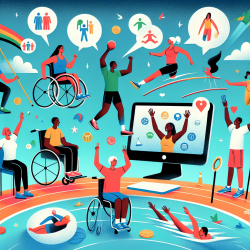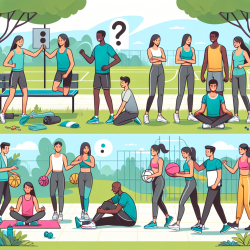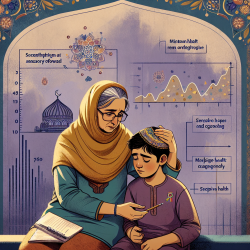Introduction
In the realm of speech-language pathology and child development, creating environments that foster autonomy and fulfill basic psychological needs is crucial. A recent study titled Satisfaction with Life in Special Olympic Athletes: The Role of Autonomy Support and Basic Need Fulfillment sheds light on how autonomy-supportive environments can enhance life satisfaction among athletes with intellectual disabilities (ID). This blog explores the implications of these findings for practitioners, especially those involved in online therapy services for schools, such as TinyEYE.
The Power of Autonomy Support
The study conducted during the Special Olympics World Winter Games 2017 involved 168 athletes with ID, revealing that an autonomy supportive sport climate (ASSC) significantly correlates with life satisfaction. This correlation is mediated by the athletes' perceived competence, underscoring the importance of fostering a sense of achievement and capability in individuals with ID.
For practitioners, this means creating therapeutic environments where children are encouraged to make choices, set personal goals, and receive positive feedback. By doing so, we not only enhance their competence but also contribute to their overall satisfaction with life.
Implementing Research Findings in Practice
Practitioners can draw from these findings to improve their therapeutic approaches:
- Encourage Autonomy: Allow children to participate in decision-making processes related to their therapy. This can involve letting them choose activities or set personal goals.
- Focus on Competence: Provide opportunities for children to experience success and mastery in their activities. Celebrate their achievements, no matter how small, to boost their confidence.
- Foster Relatedness: Create a supportive and inclusive environment where children feel connected to their peers and therapists.
Encouraging Further Research
While this study provides valuable insights, further research is necessary to explore the long-term effects of autonomy support on life satisfaction among individuals with ID. Practitioners are encouraged to engage in or support research initiatives that examine these dynamics over extended periods and in diverse settings.
Additionally, exploring the impact of autonomy support in different therapeutic contexts, such as online therapy, can provide a more comprehensive understanding of its benefits. TinyEYE, with its focus on online therapy services, is uniquely positioned to contribute to this growing body of research.
Conclusion
The findings from the study on Special Olympic athletes highlight the transformative power of autonomy support and basic need fulfillment. By integrating these principles into therapeutic practices, practitioners can significantly enhance the well-being and life satisfaction of children with ID. This approach aligns with the mission of creating great outcomes for children, a goal that every speech-language pathologist and child development specialist should strive for.
To read the original research paper, please follow this link: Satisfaction with life in Special Olympic athletes: the role of autonomy support and basic need fulfilment.










